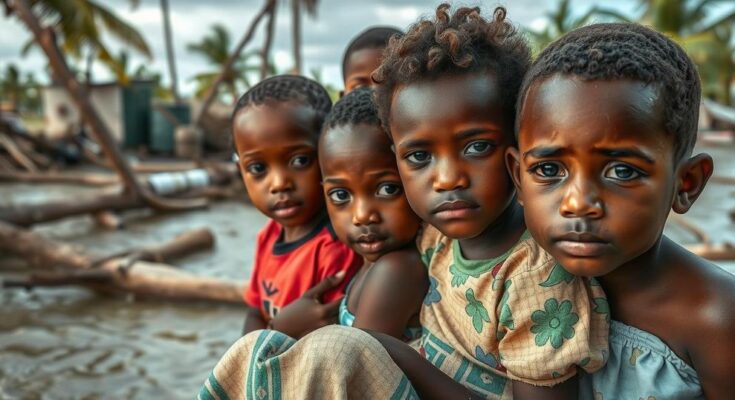Cyclone Chido hit northern Mozambique, impacting around 90,000 children and devastating Cabo Delgado province, with over 35,000 homes destroyed. The storm exacerbated existing vulnerabilities due to conflict and health crises. UN agencies are mobilizing relief efforts but face challenges in addressing the urgent needs of the affected population, including rising food insecurity concerns.
Tropical Cyclone Chido has recently devastated northern Mozambique, affecting approximately 90,000 children and displacing thousands of families in Cabo Delgado province. The cyclone has destroyed over 35,000 homes and severely impacted local infrastructure, including classrooms and health facilities. Despite the destruction impacting at least 174,000 people in total, the situation is expected to worsen as ongoing assessments reveal more damage. The UNICEF Representative in Mozambique, Mary Louise Eagleton, highlighted that children were already facing numerous emergencies due to long-standing conflicts and health crises prior to this disaster.
The cyclone caused extensive infrastructural damage near the city of Pemba, leading to the loss of roofs, electricity, and communication systems. Furthermore, the region has been grappling with a cholera outbreak, raising concerns about the compounded effects on public health. Immediate emergency relief is being coordinated through UN agencies, local partners, and the government to address the urgent needs of those affected. In the first 48 hours alone, more than 2,600 individuals received essential supplies such as blankets and mosquito nets.
As humanitarian efforts continue, the UN Secretary-General, António Guterres, has indicated that UN teams are on the ground to assist with emergency responses. However, challenges remain, particularly in rural areas where many villages have been severely impacted. Preliminary reports suggest that around 190,000 people require urgent aid, with significant damage recorded to community facilities and housing. In light of the cyclone’s impact, the World Food Programme anticipates a rising number of individuals facing food insecurity in Mozambique within the upcoming year.
Besides Mozambique, Cyclone Chido has caused various levels of destruction in Mayotte and southern Malawi, highlighting the storm’s broad-reaching effects and the urgent need for coordinated humanitarian assistance.
Cyclone Chido’s impact on northern Mozambique reflects ongoing challenges posed by climate change, which have already placed children and communities in perilous situations due to conflict, drought, and disease outbreaks. The Cabo Delgado province has been particularly vulnerable, suffering from seven years of conflict that has displaced millions. UN agencies’ ongoing assessments following the cyclone’s landfall have underscored the urgent need for humanitarian assistance amid existing health crises, such as cholera outbreaks, which are likely to worsen due to the recent disaster. Understanding these contextual factors is crucial as efforts to rebuild and support affected populations unfold.
In summary, Cyclone Chido has inflicted severe damage in northern Mozambique, affecting tens of thousands of children and thousands of families. With homes and schools destroyed and health facilities compromised, the humanitarian response is of utmost priority. The situation is exacerbated by existing conflicts and health crises, necessitating coordinated international aid efforts. Moving forward, continued support and immediate relief measures are imperative to address the needs of the affected populations and mitigate the impending food insecurity forecasted in the region.
Original Source: news.un.org




